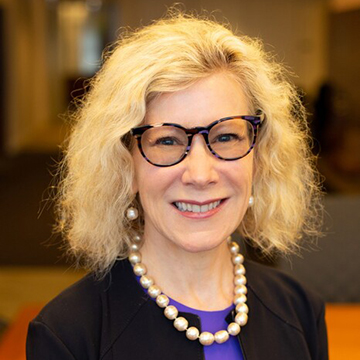Improving the Diagnosis and Treatment of Cystic Fibrosis
Susanna McColley, ’85 MD, is a professor of Pediatrics in the Division of Pulmonary and Sleep Medicine and scientific director for Interdisciplinary Research Partnerships at Stanley Manne Children’s Research Institute, concurrently with her role as Associate Clinical Director for Child Health at the Northwestern University Clinical and Translational Sciences (NUCATS) Institute. Her focus is cystic fibrosis (CF), including developing diagnostic tools and therapies, characterizing and treating early lung disease, improving health equity, and evaluating and improving newborn screening processes and infant outcomes. Northwestern University Feinberg School of Medicine Content Specialist Melissa Rohman recently interviewed McColley about her research, leadership roles, and recent discoveries.
What are your research interests?
I’ve focused on CF for over three decades. My research includes observational studies to identify risk factors for more severe disease, increasingly focused on health disparities. I have also been engaged in clinical trials of new CF therapies during a time of incredible progress in CF. The first drug for CF lung disease was approved by the FDA in 1994; we now have highly effective therapies specific to disease-causing gene variants. For the past decade, I have evaluated and led improvement activities for CF newborn screening through the Cystic Fibrosis Foundation. This has led to a major initiative to improve timeliness and equity of newborn screening. For a few years, I've been working with John Rogers and his group at the Querrey Simpson Institute for Bioelectronics (QSIB) to test a new device for sweat testing (the diagnostic test or CF) that is easier to perform and appropriate for use far away from large medical centers, including rural areas and low- and middle-income countries. We are also studying a device that can accurately measure cough frequency and severity.

The goal is to accelerate research through removing barriers and speeding the process from discovery to improved health for people. This includes workforce development with a strong focus on workforce diversity. ”
What is the ultimate goal of your research?
The goal of CF research is that every person with CF is diagnosed early and treated with therapies that prevent lung disease and reverse pancreatic damage, resulting in good health and a normal life expectancy. The long-term goal is curative therapy, but diagnosis in the first month of life and immediate access to highly effective treatment is a game-changer that is within our reach.
In my responsibilities at NUCATS and Stanley Manne, the goal is to accelerate research through removing barriers and speeding the process from discovery to improved health for people. This includes workforce development with a strong focus on workforce diversity.
How did you become interested in this area of research?
My interest in CF started in childhood when I met other children with CF. In medical school at Feinberg, I worked with John Lloyd-Still, a gastroenterologist who ran the CF Center at Children's Memorial Hospital and who trained with Harry Schwachman, one of the field's pioneers. At that time, the cause was unknown, and the care was based on symptom control and compassion. I was inspired to understand and treat CF better.
My NUCATS and Stanley Manne activities grew from a combination of curiosity and a passion for helping others to advance medicine and science. Health trajectories start in early life — everyone should collaborate with child health researchers!
What types of collaborations are you engaged in across campus (and beyond)?
I have collaborators in my division at Lurie Children's, in other departments and divisions at Northwestern Medicine, and at QSIB. Collaborators for the newborn screening work are across the US and include community partners. Much of the clinical trials work is international.
I work with leaders in NUCATS and investigators across NU departments and schools and beyond. The TL1 Program Co-Director, Evan Scott, is the best partner I could possibly have to optimize professional growth for the doctoral students, post-docs and clinical fellows who comprise our scholars.
How is your research funded?
My current research is funded by the Cystic Fibrosis Foundation, Cystic Fibrosis Foundation Therapeutics, Inc, NIH/NCATS, and industry sponsors. I was just awarded a grant from the Centers for Disease Control for a proposal to improve timeliness and equity in diagnosis of CF in babies with a positive newborn screening test. This is not a research grant, but a way to disseminate research findings while engaging parents, primary care practitioners, and public health professionals to promote immediate referral and follow-up.
Where have you recently published papers?
My most recent papers have been published in the International Journal of Newborn Screening, the American Journal of Respiratory and Critical Care Medicine, and the Journal of Cystic Fibrosis.
Written by Melissa Rohman




